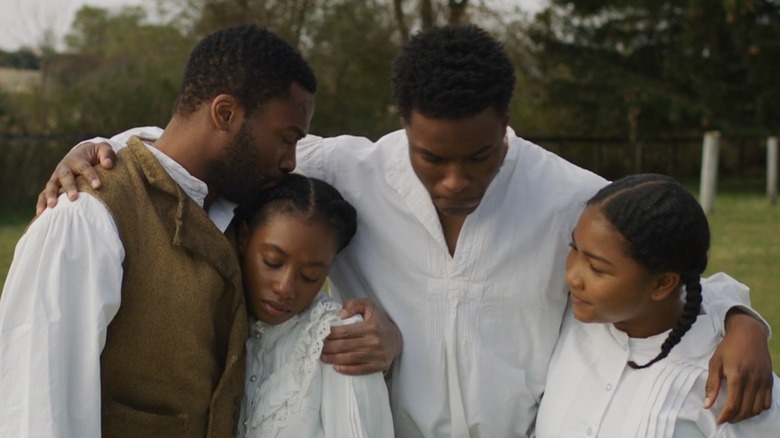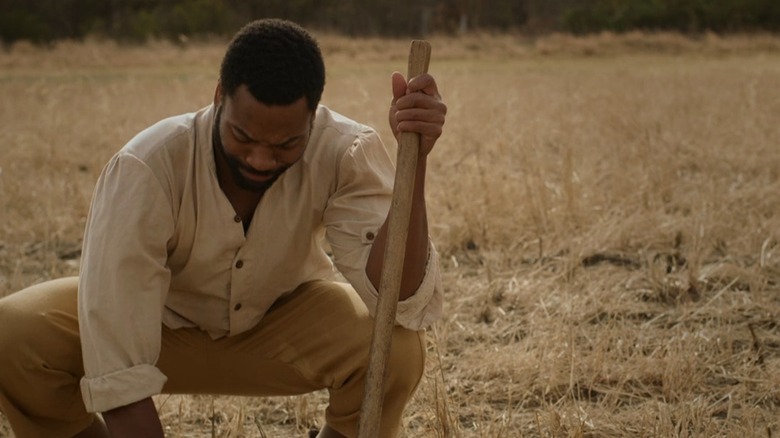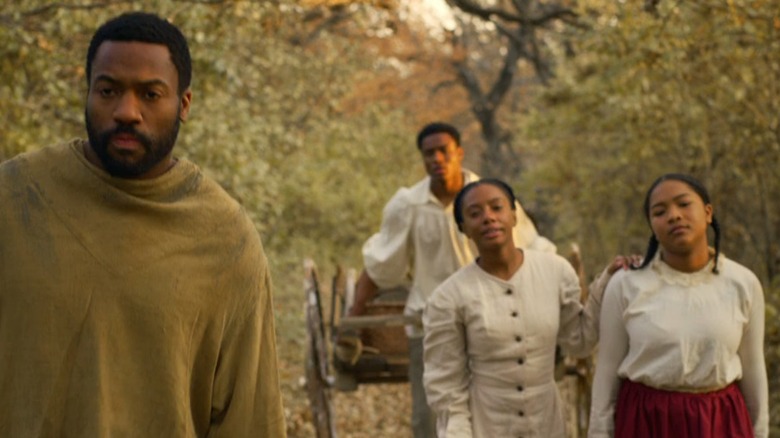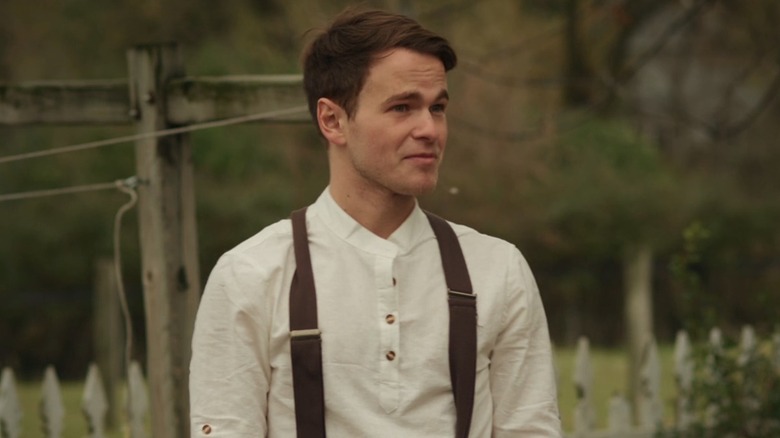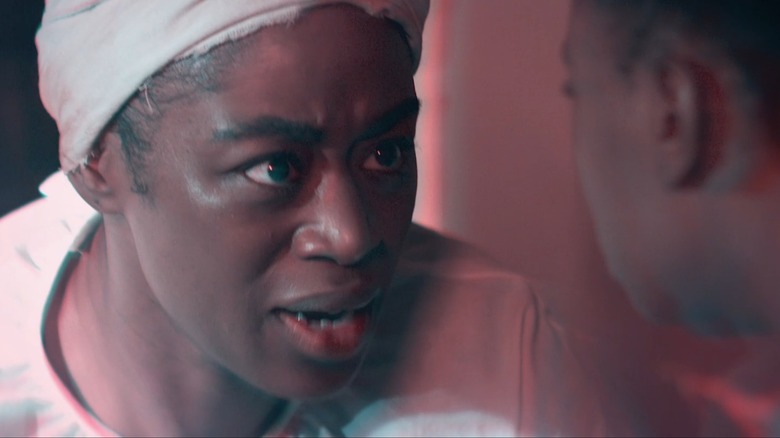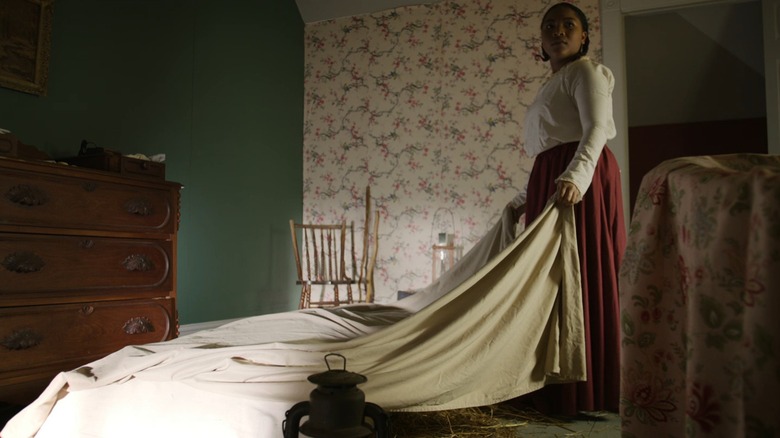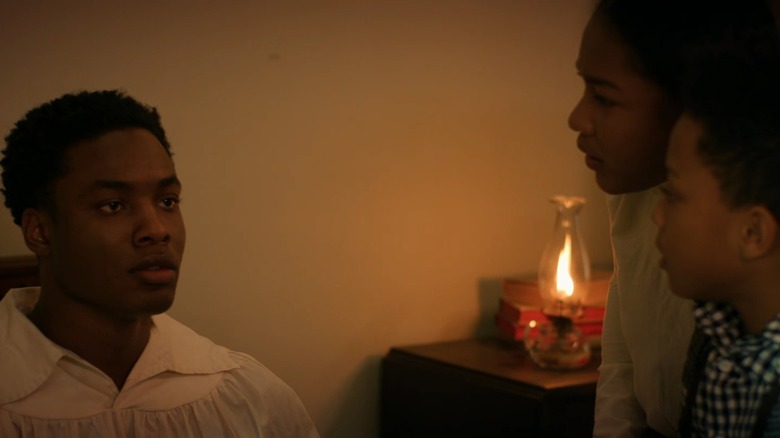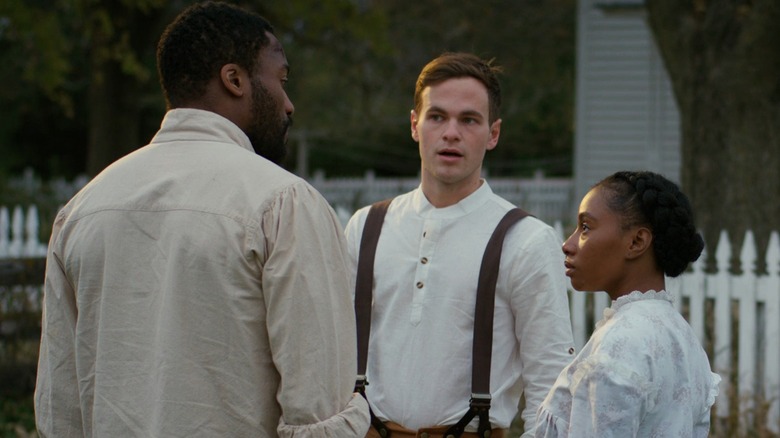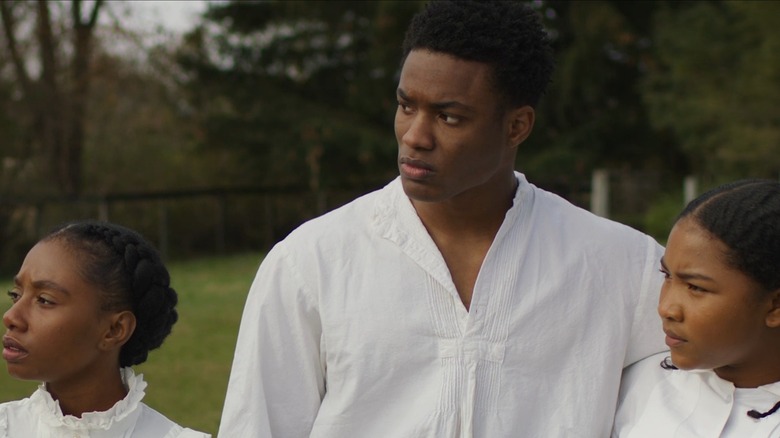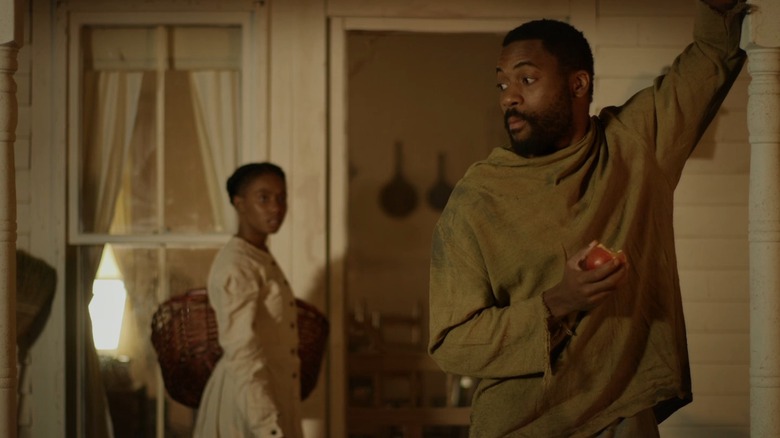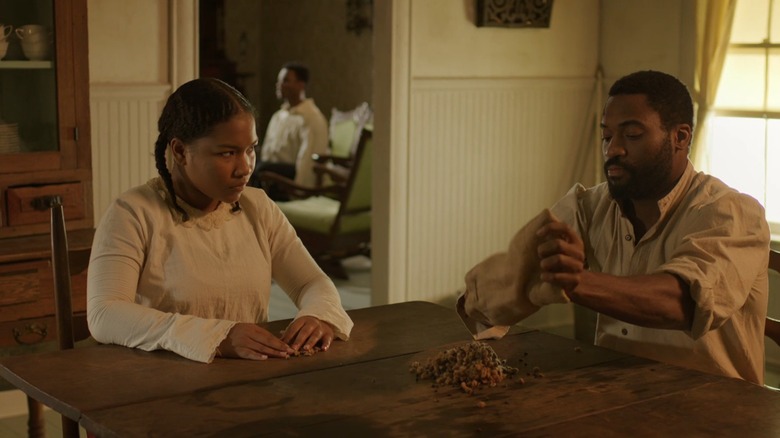The Ending Of A Southern Haunting Explained
"A Southern Haunting" is anything but your typical haunted house movie. The story is set in the early days of Reconstruction and follows a family of former slaves as they try to make a new life for themselves. Lula (Imani Hakim) and her family have been given a 40-acre plot of land, and they have dreams of starting their own successful farm. Nothing goes according to plan, and before the family knows what's happening, they're struggling against violent neighbors and a frighteningly powerful spiritual presence that's cursed the farm.
From directors M.J. Anderson and T. Huff, "A Southern Haunting" has the same hallmarks as all the best indie movies. The plot is packed with surprising turns, and the story has some genuinely important things to say. There aren't many movies that offer a clear-eyed perspective on Reconstruction, and "A Southern Haunting" pulls off its moments of historical drama just as well as its thrills and chills. In the end all the different elements of the movie tie together in time for its satisfying conclusion, but to really understand the ending of "A Southern Haunting," it's worth drilling into the film's smallest details and biggest questions.
What you need to remember about the plot of A Southern Haunting
"A Southern Haunting" begins shortly after the end of the Civil War, as former slaves are offered 40-acre farmsteads to start new lives for themselves. Lula (Imani Hakim), Hany (Laya DeLeon Hayes), Abe (Jelani Talib), Elijah (Jaden Newton), and their father (Tarik Lowe) all make their way to an abandoned Georgian farmstead that looks a little worse for wear. Lula's father is determined to build their future on the farm, with plans to turn all 40 acres into a lush peach grove.
The family meets Taran (Graham Patrick Martin), a neighboring Irishman who seems happy to have new people in the area. Unfortunately, not everyone else feels the same way. A pair of hunters (Jordan Rawlins and Sam Bloomquist) make their way through the family's field, attacking Abe and his father to assert their right to do whatever they please. Another white man named Malachi (Jeremy Mahr) refuses to believe that the family owns their home, and after viciously harassing them he runs over Elijah, killing the young boy.
It's bad enough struggling against their hateful neighbors, but Lula's family also has to contend with a stranger force occupying their land. The ground itself seems cursed, and after a few borderline supernatural encounters, Abe suddenly goes catatonic. He's completely unresponsive to everything around him, leaving the rest of the family to feel like they've lost both of their boys. Sadly, as bad as things are when Abe falls ill, the worst is still yet to come.
What happened at the end of A Southern Haunting
Lula goes to check on Taran, who's been kind enough to give her family books and offer them medical advice on how to best treat Abe. She finds that Taran and his sister have been attacked by some of the area's least pleasant families. While helping Taran, Lula tells him all about the strange supernatural occurrences on her farm. With some sudden insight from the mysterious spirits haunting the place, she decides to check out the family's well and asks Taran for his help.
At first Taran seems reluctant to assist, but it's not until she reaches the bottom of the well that she finds out why. A rotting skeleton awaits Lula in the well, and when she sees it, the spirit haunting the farm reaches out and gives her a vision. Lula learns that long ago her mother (Naiyah D. Scaife) escaped slavery and hid away on this farm with the help of the woman who owned the land. Taran turned Lula's mother and the woman over to the Confederate soldiers, hoping to claim the land for himself.
Taran attempts to kill Lula at the well in a final grab for the land, but her father rescues her. Then the two of them reach out to the spirit, and Lula gets to talk to her mother face-to-face. Once Lula's mother moves on to the next life, Abe is freed from his stupor, and the curse on the land is lifted.
How did the family end up on Taran's farm?
There's one really big coincidence at the heart of "A Southern Haunting." Well before the end of the Civil War, Lula's mother escaped from slavery and ended up on a farm offering safe haven. After the war, her family just so happened to be given the exact same plot of land. Is there some deeper secret hidden here?
It's tempting to wave the coincidence away as a bit of necessary convenience for the story. If Lula doesn't make her way to the farm where her mother died, then the entire "haunting" aspect of "A Southern Haunting" completely falls apart. As easy as it would be to disregard the coincidence entirely, there's actually some evidence in the movie that Lula's mother might have caused her family to end up on the farm.
In this particular movie, ghosts are powerful forces. With the sheer might of her will, Lula's mother locks Abe into a trance for his own protection, and she scares Malachi so badly that he literally runs screaming from the farm. She is also able to give Lula visions of the past and communicate with her in a very real sense. We don't know the full extent of those ghostly abilities, but it's not out of the question to think that Lula's mother spiritually influenced her family into finding her final resting place.
What really happened to the family's mother?
Despite her relatively small amount of screentime, Lula's mother might be the most important character in the entire movie. In the early portion of the film, her story is a mystery, but it's clear that her absence is putting a strain on the rest of the family. What heightens the tension even more is that Lula and the other children clearly blame their father for their mother's absence to some small extent.
When Lula and her father argue about whether or not her mother would have wanted them to stay on the farm, we get our first peek at what happened to her. She ran away from her slave owners on multiple occasions, but every time she got caught because she was trying to secure a path away for her family. Eventually Lula's father told their mother that if she ever managed to get away again, she should keep running.
That's exactly what happened. Lula's mother escaped and seemingly found herself on the underground railroad. The farmhouse that Lula's family later owns had a number of small hiding places that the former owners used to help hide slaves on the run. Even after Taran handed the slaves over to the Confederates, Lula's mother had a chance to escape. A Confederate soldier offered her freedom if she willingly killed the other slaves and the woman that tried to help her escape. Instead of giving in, Lula's mother fought back, and the soldier killed her for it.
Did anyone know the farm was haunted?
The full timeline of "A Southern Haunting" is a bit murky, but it's obvious that Lula's mother died on the farm long before the rest of the family ever arrived. The haunting presumably began right after the slaughter on the farm, but that doesn't necessarily mean that anyone had any ghostly encounters before Lula and the rest of her family arrived. Taran didn't actually live in the farmhouse, and he didn't spend much time maintaining the fields either, so he never really got to experience what was happening on the property.
There are, however, a couple of other characters who do seem to have an understanding of what's happening on the farm. The hunters who harass Abe and his father on their very first day working the fields make a few vague references to the curse on the land. In all likelihood, though, the hunters are just talking about the land being fallow. They probably don't know anything about the haunting.
"A Southern Haunting" hides a couple of twists. In the movie's earliest scenes, it poses as a standard ghost story to throw audiences off the familial twist at the heart of the film. The hunters fit into that careful set up. They make the audience think the family has just inherited a house that the locals know is haunted by some ghoul or demon, and that makes the surprise about Lula's mother all the more powerful.
What really happened to Abe?
Hany doesn't have too much ghostly contact throughout the movie, but she is one of the first children that the ghost reveals itself to. Hany is cleaning in the house alone when she sees the shape of a human underneath a white sheet. From under the sheet, a hand reaches out to her, and Hany nearly touches it before Lula walks into the room and the ghost suddenly vanishes. The very next day the children find Abe sitting alone in a closet, completely catatonic.
Hany might have suffered Abe's fate if she'd really reached under the sheet. We don't get to see the moment that the ghost takes control of Abe, but it seems reasonable to assume that it lured him in the same way that it did Hany. Abe being locked inside a waking coma terrifies the rest of the family, and it's not until the end of the movie that they realize the ghost isn't trying to hurt him.
Lula's mother is looking after her family from the afterlife, but she doesn't have that many ways to intervene in their lives. She takes control of Abe's body as a means of protecting him from all the people in the area who want to hurt him and the rest of the family. By essentially possessing him, Abe's mother is able to prevent him from getting into any trouble, and she can use his ghostly jump-scaring powers to make him vanish from any room when trouble inevitably arrives.
Was Taran a villain all along?
Taran is a delightfully twisted character. When Lula and her family first arrive, Taran seems like the only genuinely nice person in the area. He offers the family books, medical assistance, and friendship. When others, like Malachi, threaten Lula's family, Taran seems entirely willing to help them fight back.
Eventually Taran's friendly veneer shatters, revealing a dark and murderous man. Taran has killed Lula's mother and half a dozen other people in his attempt to get the farm. He might already have a home of his own, but he's willing to do anything it takes to grow his own wealth. The real reason he tries to befriend Lula's family is so that he can find an opening to steal the land from them.
The best that you can say about Taran is that he isn't as racist as the other people Lula's family encounters. He doesn't hate Lula because of the color of her skin, but he's entirely willing to exploit the hatred of others for his own gain. If the rest of the world wasn't so filled with hate, Taran would never have been able to make his grab for the land in the first place. So in reality the movie's main villain is, fittingly, the Confederate mindset itself.
What will happen to the Mothers family now?
By the end of the movie, Lula's family has suffered an unimaginable amount of loss. They've learned that their mother was killed by Confederate soldiers, and they've witnessed the death of the family's youngest son, Elijah. They've been beaten, but by reconnecting with the ghost of Lula's mother, they've also found a new reason for hope.
When the family first arrives on the farm, it seems like their fate is sealed. The land is all but dead, and they have only six months to turn a profit to pay the taxes on the farm. It seems like they'll be stuck growing cotton instead of the peaches that Lula's father dreams about. Once the curse on the land is lifted, the family suddenly has new opportunities.
Abe tells a group of soldiers that the family is growing peanuts for the money until their peach trees are able to mature. The farmland surrounding them is green and blossoming. For the first time, the family has a real chance at sustainable freedom. If the movie has taught us anything, it's that Lula's family won't have an easy time of it going forward, but in a happy twist they aren't doomed to failure either.
What have the producers said about the film?
From the outside looking in, "A Southern Haunting" looks like any other Hollywood ghost story. The movie has a unique and insightful take on American Reconstruction, but beyond that, most people would probably have a hard time identifying it as the tiny independent production that it really is. In reality, "A Southern Haunting" was all but locally produced, and it isn't really a Southern movie at all.
Speaking with radio host B-Sox, associate producer Tariq Lundy talked about his utter surprise at finding himself in the movie business. "I didn't know I was making a movie either, but when you get a random call from a director in LA saying, 'We're bringing a movie from Georgia to the state of Iowa, and we need your help,' you kind of perk up," Lundy said. Lundy is a Des Moines local who never imagined himself working as a movie producer.
The call might have come as a surprise, but Lundy dove into the project headfirst. He reached out to local contacts who helped build sets and design costumes to keep the movie under budget. Filming happened all the way back in 2019, but the movie got delayed to 2023 because of COVID-19. According to Lundy, more and more films are coming to Iowa in the wake of the pandemic, and his next project might see him reuniting with "A Southern Haunting" directors M.J. Anderson and T. Huff.
Will there be A Southern Haunting 2?
"A Southern Haunting" does a great job crafting its characters and making you fall in love with the Mothers family. The movie ends on a happy note, but there are undoubtedly going to be more struggles for the family. As fans of the film, it's only natural to wonder if we'll get to catch up with Lula and the others in the future to see how they're progressing on their little peach farm.
Well, never say never, but if there is going to be a sequel to "A Southern Haunting," we'll probably need to wait quite a while for it. The movie had an incredibly small budget to begin with, and its release schedule didn't give it much of a chance to turn a big profit. "A Southern Haunting" only screened in a few select theaters, and less than two months after its theatrical release it moved over to streaming on Starz.
The other thing working against a sequel for "A Southern Haunting" is time. The movie was originally filmed in October 2019. The writers, directors, and stars all might have had enough enthusiasm for another movie back then, but after four years, all of them are likely involved in other projects. Nothing is impossible, though. Fans just need to keep their fingers crossed.
